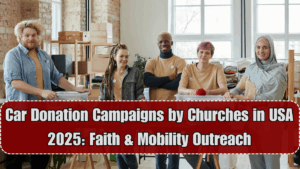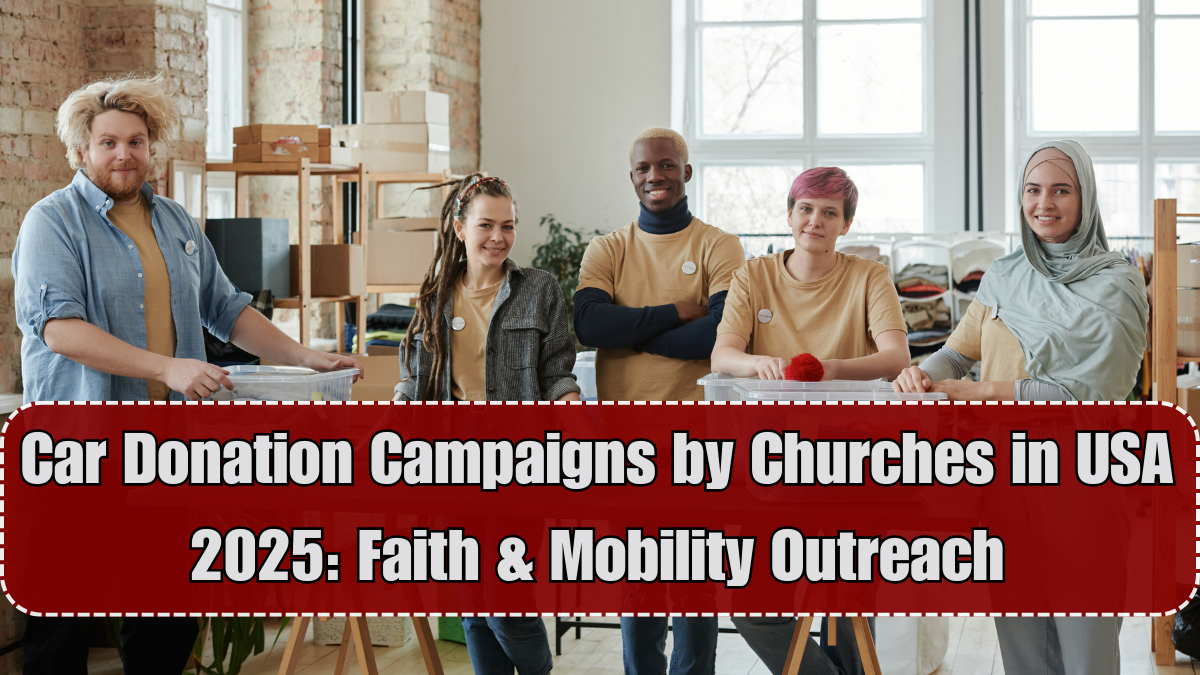In 2025, car donation programs by churches USA 2025 have become a major faith-led initiative to help underprivileged families, veterans, single mothers, and local ministries gain access to reliable transportation. These car donation campaigns are not just about giving away vehicles—they represent a broader mission of mobility, dignity, and outreach driven by Christian compassion.
Across the United States, churches have teamed up with auto dealerships, nonprofits, and community service organizations to accept donated vehicles and redistribute them to those in real need. The movement is rapidly growing as more donors see the tangible impact their old cars can make in someone’s life.

How Church Car Donation Campaigns Work in 2025
The car donation programs by churches USA 2025 operate through a well-organized system. Many churches have now established their own car donation portals or collaborate with national auto charity organizations. Vehicles—regardless of age or condition—are accepted, inspected, and either gifted or sold for funds used in ministry and outreach.
Typical process:
-
Donor fills out a quick vehicle donation form online or at church
-
The church or partner organization arranges free vehicle pickup
-
Cars are inspected and assessed for gifting or reselling
-
Title transfer and IRS-compliant receipts are issued
-
Either the vehicle is given to a beneficiary, or proceeds go to church outreach projects
This process allows donors to get tax deductions while empowering churches to meet community transportation needs through faith and mobility outreach.
Table: Car Donation Program Benefits – 2025
| Benefit for Donors | Benefit for Recipients | Benefit for Churches |
|---|---|---|
| IRS-compliant tax deduction | Access to reliable transport | Funds for outreach programs |
| Free pickup & easy process | Help with job access or school | Community growth & involvement |
| Vehicle put to good use | Reduced dependency on public transit | Faith-based service visibility |
Through these church car donation USA programs, transportation becomes a tool for transformation—whether helping someone get to work, school, or worship.
Why 2025 Is the Year of Auto-Based Charity
The economic challenges many communities still face have made vehicle access more vital than ever. Churches recognize that without a car, individuals can be locked out of opportunity—unable to get to jobs, healthcare, or education.
In 2025, the auto charity push has gained even more strength because:
-
Used car prices remain high, making direct donation programs highly valuable
-
Government is offering tax perks for charitable auto donations
-
Churches are expanding their mobility-focused ministries post-COVID
-
Many faith communities are combining EV donations and fuel-efficient car gifting
By stepping into this space, churches are becoming modern-day mobility providers with a mission rooted in compassion and service.
Who Can Receive Donated Cars?
Most car donation programs by churches USA 2025 have eligibility criteria that prioritize individuals who:
-
Are single mothers or widows
-
Are transitioning out of homelessness
-
Are veterans or formerly incarcerated persons
-
Need reliable transport for work or education
-
Serve in local ministry or outreach activities
These recipients are often nominated by congregation members or partner nonprofits. Vehicles are gifted with basic servicing completed and legal paperwork handled.
FAQs
How can I donate my old car to a church in 2025?
You can visit your local church or their partnered auto charity website to fill out a simple donation form.
What kinds of vehicles are accepted?
Most programs accept cars, vans, trucks, and even motorcycles—regardless of their condition.
Is my donation tax-deductible?
Yes, you’ll receive an IRS-compliant receipt for your donation, which qualifies for a tax deduction.
Can I choose who gets my donated car?
Usually, churches assign vehicles based on need. However, some allow donor preferences in special cases.
What happens if my car doesn’t run?
Non-running vehicles are still accepted. They’re either repaired, sold for parts, or auctioned to fund other causes.
How does this help the church?
It expands the church’s community outreach and provides them a platform to serve through practical generosity.
Click here to know more.
